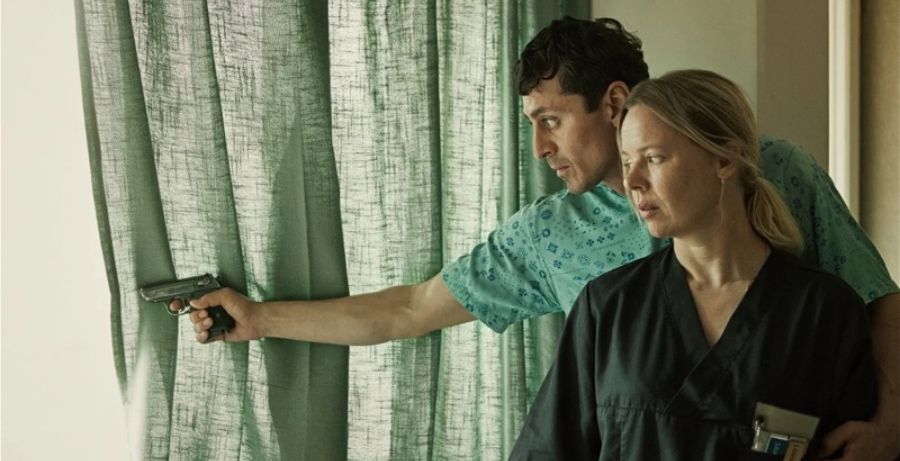One morning, Artan (Alexej Manvelov, Jack Ryan) came to the medical practice his wife Louise (Alma Pöysti) works at to see his daughter. When he is refused access to her, he pulls a gun and starts making demands of those around him. The situation escalates until Officer Lukas (Fares Fares) intervenes with Artan and sets up a car for him and Louise to leave, with Lukas driving. What becomes of the trio plays out in the emotionally driven story, A Day and a Half, directed by Fares Fares, and written by Peter Smirnakos and Fares.
One of my favorite approaches to storytelling is when a narrative plays with the viewer’s expectations. It allows you to draw an immediate conclusion, only to slowly challenge that assumption with new information as the story plays out. This is the case in A Day and a Half. As the situation unfolds, the viewer immediately assumes that Artan is unequivocally the bad guy in the situation. That he has created the scenario that has caused his wife to take his daughter from him and that this latest act is merely another sign of why he now finds himself alone.
But even from early on, we see indications that he might not be as bad a guy as the initial moments leave us believing. He gladly allows everyone else at the doctor’s office to leave, seeing no need to involve extra people in their standoff. And once the trio takes to the streets in their car, we see interactions that further muddy the emotional waters. Now, obviously, nothing that could’ve transpired in the past excuses taking someone at gunpoint against their will, but A Day and a Half does a great job of making the viewer wonder if this is a crime of desperation or one of vengeance and anger.
This view of the story’s main character is further helped by the film’s decision not to try to sensationalize anything. Rather than push up close camera angles and have the actors drive emotional moments to their limits in an attempt to keep the viewer on edge, the film’s camera work and acting keep the film tense, but rarely to the point of bubbling over.

The stand-out scene of A Day and a Half is when the tension finally feels like it is going to escalate to the point of no return. When the trio stops at Louise’s parents’ house at the demand of Artan so he can see his daughter, the inlaws are anything but level-headed about the situation. The verbal abuse that is slung at Artan, despite the fact that he is there with a gun to their daughter’s head, is when the viewer starts to truly realize how much of the events leading up to this situation may not have been fully his fault. Even Louise, in tears with a pistol to her head, is not free of her mother’s venomous scolding. It is a scene that feels both surreal and immensely believable.
While all of the acting in A Day and a Half delivers on, and further builds up, the emotional tension of the film, the stand out is Fares. As the random street officer who is in no way qualified to handle the situation that is unfolding, Fares delivers the character’s sincerity in simply wanting to see everyone walk away in one piece. His struggles to maintain his composure are eloquently delivered. Especially during the final stretch of the film, as his own personal life begins to get mixed in with the larger scenario.
Reading the synopsis for A Day and a Half, viewers would expect a tense thriller about a hostage situation. While it doesn’t deliver that, what it does deliver is an emotional story that plays with the viewer’s pre-conceived notions of a situation as it draws them into its moving and intricate narrative.
A Day and a Half is streaming now on Netflix.
A Day and a Half
-
Rating - 8/108/10
TL;DR
A Day and a Half delivers an emotional story that plays with the viewer’s pre-conceived notions of a situation as it draws them into its moving and intricate narrative.







